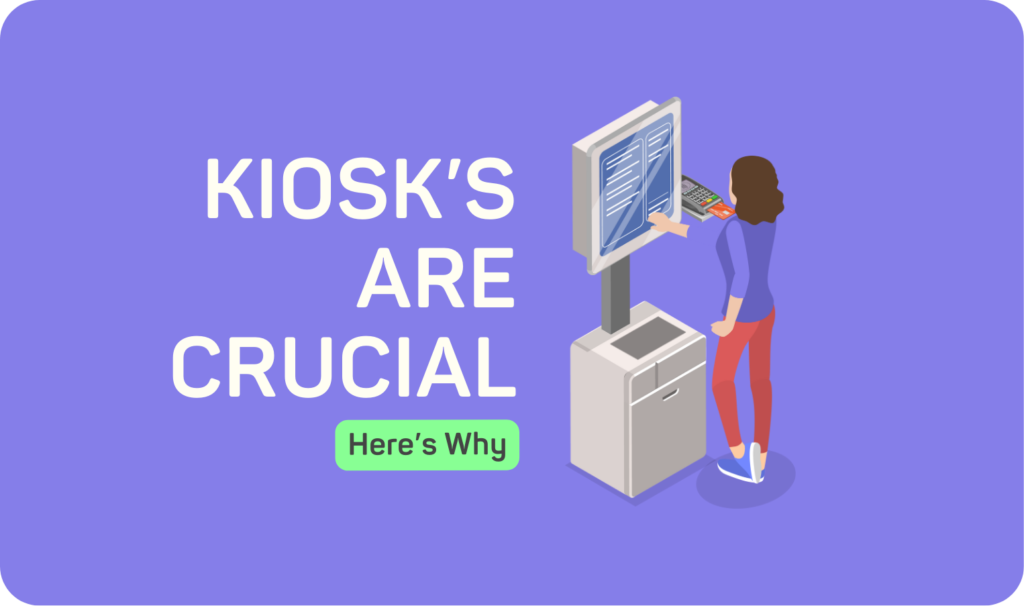Crucial Role of Kiosks in Queue Management Systems

Long waiting lines are not only frustrating but can also drive customers away, impacting a business’s reputation and revenue. To address this challenge, queue management systems have evolved, with kiosks playing a pivotal role in optimizing customer flow, reducing wait times, and enhancing the overall service experience.
The integration of kiosks into queue management systems is transforming the way businesses handle queues, offering a seamless and automated approach that benefits both service providers and customers alike.
What Are Kiosks?
Kiosks are self-service machines that allow users to interact with a computer system without the need for human assistance. They are often equipped with touchscreens and user-friendly interfaces, making it easy for customers to navigate through different options.
In the context of queue management, kiosks are typically used to help customers check-in, select the type of service they require, and receive their queue number. The system then informs them of their estimated wait time and alerts them when it’s their turn to be served.
Benefits of Kiosks in Queue Management Systems
1. Streamlining the Check-in Process
Kiosks simplify the check-in process by allowing customers to independently register their arrival. Upon entering a business, a customer can approach a kiosk, input their details, and select the service they need. This process is much faster compared to manual registration methods, where customers might have to wait for a receptionist or staff member to process their information. The speed and accuracy of kiosk check-ins reduce bottlenecks at the front of the queue and ensure customers are swiftly entered into the system.
2. Reducing Human Error
One of the main advantages of kiosks in queue management is the reduction of human error. Staff members handling high volumes of customers can sometimes make mistakes, such as issuing the wrong ticket number or entering incorrect details. Kiosks, on the other hand, are programmed to follow strict protocols, ensuring that each customer is accurately registered and directed to the appropriate service. This minimizes confusion and ensures that the queue is managed efficiently.
3. Enhancing Customer Experience
Customers today expect quick and efficient service. Long wait times can lead to dissatisfaction and even loss of business. Kiosks enhance the overall customer experience by providing real-time updates on wait times and service progress. Many systems allow customers to see how many people are ahead of them in the queue, which can alleviate anxiety and improve the perception of the waiting experience. This has shown an increase in customer satisfaction of approximately 35% in many cases. Additionally, kiosks allow customers to engage with the service process in a more interactive and transparent way, contributing to a more positive experience.
4. Optimizing Resource Allocation
By tracking customer arrivals and the services they require, kiosks provide businesses with valuable data that can be used to optimize resource allocation. For example, a business can identify peak hours and ensure that sufficient staff are available to handle the influx of customers. This helps prevent understaffing during busy times and ensures that customers are served efficiently. Furthermore, kiosks can automatically direct customers to the appropriate service counter or department based on their needs, reducing unnecessary wait times and ensuring that resources are used effectively.
5. Enabling Contactless Service
In the wake of the COVID-19 pandemic, contactless service options have become more important than ever. Kiosks offer a hygienic alternative to traditional queue management methods, as customers can interact with the system without the need for close contact with staff members. Some kiosks even allow for touchless interaction, such as through mobile phone scanning or voice commands. This not only ensures the safety of both customers and employees but also caters to the growing demand for contactless services in a post-pandemic world.
Industries Benefiting from Kiosk-Based Queue Management
Kiosks are being adopted across a wide range of industries to improve queue management. Some of the key sectors where kiosks are making a significant impact include:
- Retail: Kiosks in stores allow customers to register for customer service, product inquiries, or returns, streamlining the process and minimizing long lines at customer service desks.
- الرعاية الصحية: Hospitals and clinics use kiosks to manage patient check-ins, ensuring that appointments are kept on schedule and reducing waiting times for patients.
- Government Services: From post offices to public service departments, kiosks help manage the large volumes of people needing assistance, improving the efficiency of public service delivery.
- Airports: Self-service kiosks in airports help passengers check-in, select seats, and print boarding passes, reducing the pressure on airline staff and speeding up the boarding process.
Conclusion
Kiosks have become an essential component of modern queue management systems, offering numerous benefits such as streamlining check-ins, reducing human error, and enhancing the customer experience. Their ability to optimize resource allocation and provide contactless service options has made them indispensable in various industries.
As businesses continue to seek ways to improve service efficiency, the role of kiosks in queue management systems will only grow, ensuring smoother, faster, and more efficient service delivery for customers worldwide.




